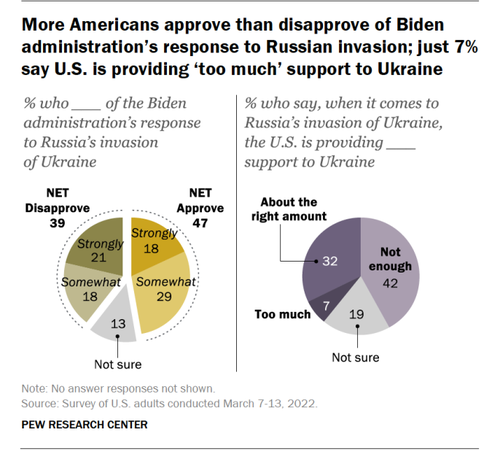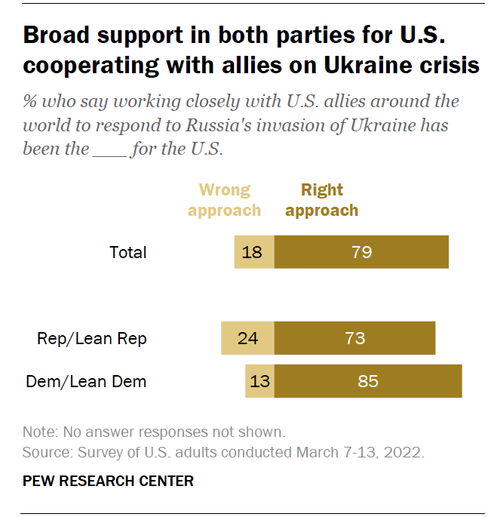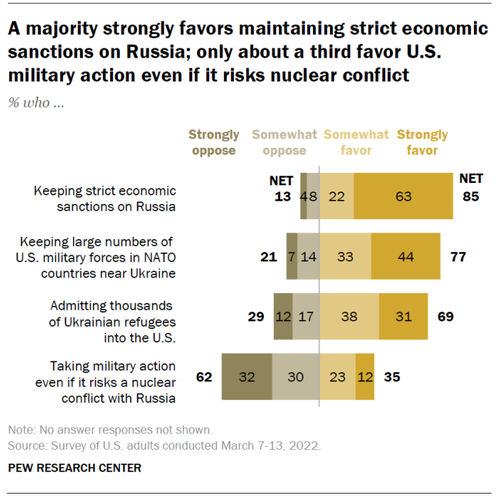by Tyler Durden
Wednesday, Mar 16, 2022
With Ukrainian President Volodomyr Zelensky receiving a standing ovation Wednesday morning after his brief address to Congress, you should know that over 1/3 of Americans polled by Pew Research support the US ‘taking military action even if it risks a nuclear conflict with Russia.’
New Pew poll on Ukraine war: Thirty-five percent of Americans support the US 'taking military action even if it risks a nuclear conflict with Russia.' (62 percent oppose.) https://t.co/7TcpmEHkc7 pic.twitter.com/JsDoi2r09H
— Byron York (@ByronYork) March 16, 2022
Public Expresses Mixed Views of U.S. Response to Russia’s Invasion of Ukraine
35% favor U.S. military action even if it risks nuclear conflict with Russia
Three weeks into Russia’s military invasion of Ukraine, nearly half of Americans (47%) approve of the Biden administration’s handling of the Russian invasion, while about four-in-ten (39%) disapprove; 13% say they are not sure.
Roughly a third of Americans (32%) say that the United States is providing about the right amount of support to Ukraine as it fights to hold off the Russian invasion. A larger share – 42% – say the U.S. should be providing more support to Ukraine, while just 7% say it is providing too much support. About one-in-five (19%) say they are not sure.
However, virtually identical shares in both parties – 51% of Republicans and Republican-leaning independents and 50% of Democrats and Democratic leaners – regard the Russian invasion as a “major threat” to U.S. interests.
Moreover, there are several aspects of U.S. policy toward Russia and Ukraine that draw bipartisan support. While Republicans have previously expressed skepticism about the extent to which the U.S. should work with its allies, nearly three-quarters of Republicans (73%) say that working closely with allies to respond to the Russian invasion is the right approach. An even larger share of Democrats (85%) say the same.
Large majorities also favor keeping large numbers of U.S. military forces in NATO countries near Ukraine in response to the conflict (77%), a position shared by 75% of Republicans and 81% of Democrats.
However, most Americans (62%) say they would oppose the U.S. “taking military action even if it risks a nuclear conflict with Russia.” About a third (35%) of Americans say they would favor military action in this scenario. Comparable shares in both parties (36% of Republicans, 35% of Democrats) say they would favor military action even if it risks nuclear conflict with Russia.
The new survey also finds:
Broad public attention to Russian invasion. About seven-in-ten adults (69%) now report having read or heard a lot about the Russian invasion, compared with 23% who said they had read or heard a lot about Russia’s military buildup on its border with Ukraine in a January survey.
Today, nearly identical shares of Republicans (70%) and Democrats (71%) say they have heard or read a lot about the invasion.
Biden job approval largely unchanged from January. Currently, 43% of Americans approve of how Joe Biden is handling his job as president, while 55% disapprove. That is little changed since January, when 41% approved of Biden’s job performance.
Nearly half approve of Biden administration’s response to Russia’s invasion; more say U.S. is doing too little than right amount for Ukraine
Overall, more Americans approve (47%) than disapprove (39%) of the Biden administration’s response to Russia’s invasion of Ukraine, while 13% say they are not sure.
For the most part, the patterns of opinion on the administration’s handling of the Russian invasion are similar to those in views of Biden’s overall job performance.
Democrats and Democratic leaners largely approve of the administration’s response to the Russian invasion (69% approve), while Republicans and Republican leaners mostly disapprove (67% disapprove).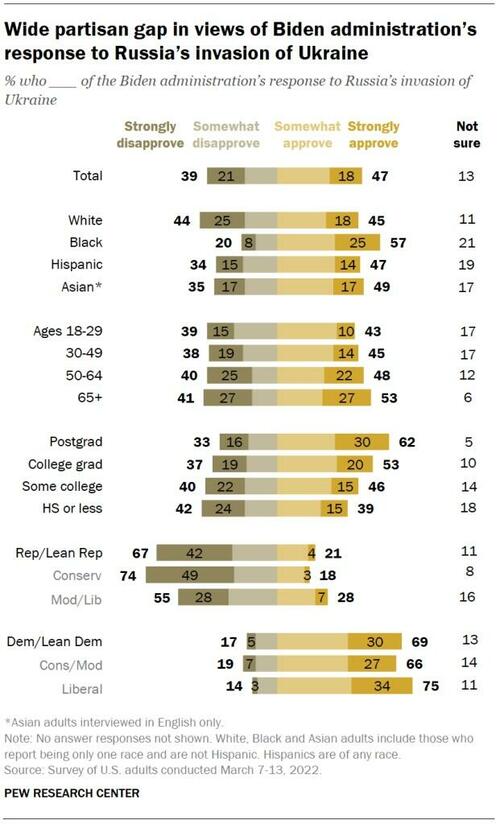
There also are educational differences in views of the Biden administration’s response to the Russian invasion. Nearly six-in-ten (57%) of those with at least a four-year college degree approve of the administration’s response, compared with 42% of those who have not completed college.
There is a correlation between Biden’s overall job rating and views of his administration’s response to the Russian invasion of Ukraine. Among those who disapprove of Biden’s job performance, most (63%) disapprove of the administration’s Ukraine response; still, 22% approve and 14% are not sure. Among the 43% of the public who approves of Biden’s overall job performance, very few (just 9%) disapprove of the administration’s response to the invasion, while 11% are unsure and 79% approve.
U.S. support for Ukraine
About a third of Americans overall say the U.S. is providing about the right amount of support for Ukraine, while a larger share (42%) say it is not providing enough support; just 7% say it is providing too much support, while 19% are not sure.
While there are deep partisan divides in views of the administration’s response to the crisis, views on U.S. support to Ukraine are less divided. Nearly half of Republicans (49%) say the U.S. is providing too little support; 23% say it is providing about the right amount and 9% think the U.S. is giving Ukraine too much support.
Among Democrats, comparable shares say the U.S. is providing Ukraine about the right amount of support (39%) and too little backing (38%). Just 5% of Democrats say the U.S. is giving Ukraine too much support – roughly half the share of Republicans who say the same.
There are modest ideological differences within both parties in views of support for Ukraine: A 54% majority of conservative Republicans (54%) say the U.S. is not doing enough for Ukraine, compared with 41% of moderate and liberal Republicans. Among Democrats, liberals (43%) are more likely than moderates and conservatives (34%) to say the U.S. is not providing enough support.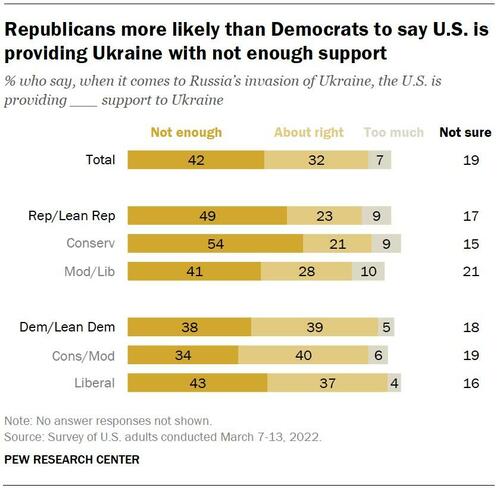
About half of those who approve of the administration’s response (48%) say the U.S. is providing about the right amount of support to Ukraine, while four-in-ten favor increasing the amount of support and hardly any (2%) say the U.S. is providing too much support.
Half of adults say Russia’s invasion of Ukraine is a ‘major threat’ to U.S. interests
Half of Americans say Russia’s invasion of Ukraine is a major threat to U.S. interests, while another 28% say it is a minor threat; just 6% say the invasion is not a threat to U.S. interests, while 16% are not sure. This marks a substantial change since before the Russian invasion; in January, just 26% said “Russia’s military buildup near its border with Ukraine” posed a major threat to U.S. interests.
Republicans and Democrats express virtually identical views of the threat from Russia’s invasion; 51% of Republicans and 50% of Democrats say it is a major threat to U.S. interests. In January, about a quarter in each party viewed Russia’s military buildup near Ukraine as a major threat.
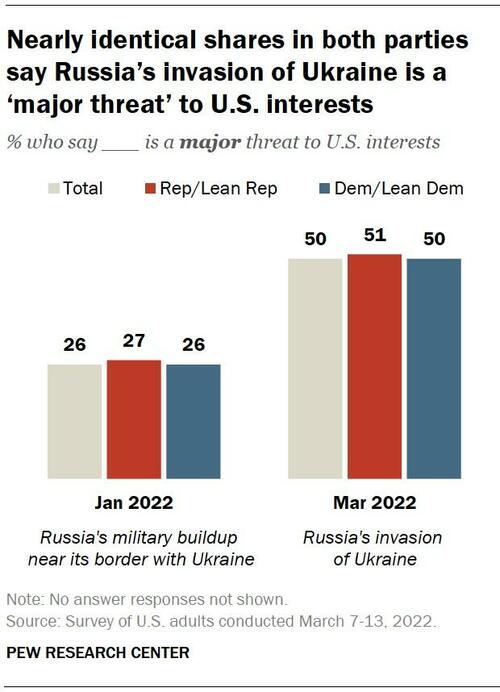

More than eight-in-ten Democrats and Democratic leaners (88%) and Republicans and Republican leaners (85%) favor keeping strict economic sanctions on Russia. And at least six-in-ten in each party strongly favor maintaining strict sanctions (68% of Democrats, 61% of Republicans).
Similar shares of Republicans (75%) and Democrats (81%) favor keeping a large military presence in NATO countries located near Ukraine. And there is limited support among both Republicans and Democrats for taking military action, even if it risks a nuclear conflict with Russia: About a third of the public (35%) and nearly identical shares of Democrats (35%) and Republicans (36%) favor this.
However, Democrats are substantially more likely than Republicans to favor admitting thousands of Ukrainian refugees into the U.S.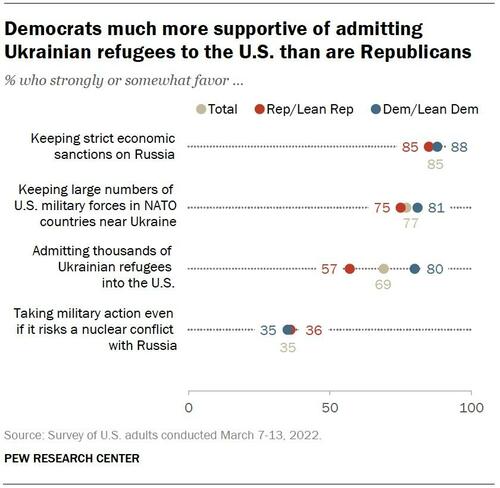
And Democrats are about twice as likely as Republicans to strongly favor admitting thousands of Ukrainian refugees into the U.S.: 42% of Democrats strongly favor this, compared with 20% of Republicans.
Little change in views of Biden’s job performance
The public’s views of Joe Biden’s job performance have changed little since January. Today, 43% of Americans say they approve of the way Joe Biden is handling his job as president; 41% gave Biden a positive job rating in January. Biden’s job ratings have remained fairly stable over the past six months, after declining sharply last summer.
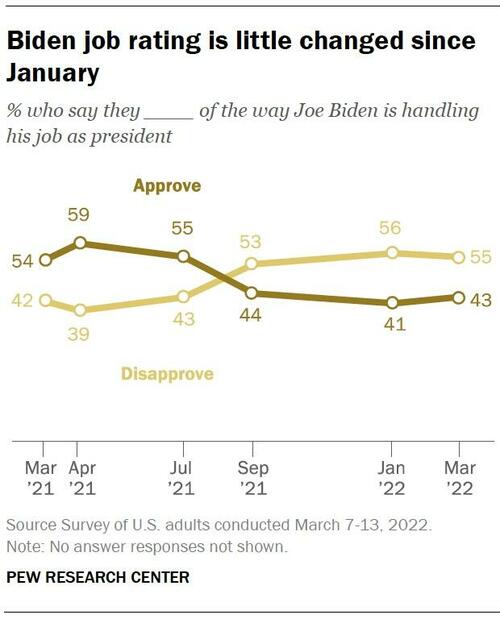
Published at www.zerohedge.com
We remind our readers that publication of articles on our site does not mean that we agree with what is written. Our policy is to publish anything which we consider of interest, so as to assist our readers in forming their opinions. Sometimes we even publish articles with which we totally disagree, since we believe it is important for our readers to be informed on as wide a spectrum of views as possible.
